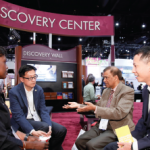“Only 0.8% of ACR members who responded to the most recent ACR Workforce Study and treat adults identify as African-American,” he says. “The study authors recommended diversity of the workforce as a critical topic of concern for the ACR and an area in which the ACR should focus specific initiatives. [In addition,] millennials, and particularly millennials of color, report the desire for engagement with activities tied to a strong sense of purpose and meaning. Thus, by focusing the initial phase of UCOIN on the reduction of health disparities in rheumatic disease and appropriately communicating the intention to the community, UCOIN will support increasing diversity among the ACR membership.”
The Program
Under UCOIN, ACR members can design and implement projects that advance the mission of reducing health disparities. Dr. Lim says a tailored process will generate ideas through communication forums and marketing of the grant funding. In particular, the program will look to support ideas from younger ACR members, in part through coaching from more senior members of the specialty.3
That approach would simultaneously help develop and disseminate “innovative, problem-solving projects and products from the ideas” and normalize “innovative thinking within the ACR,” Dr. Lim says.
Dr. Lim says that rank-and-file rheumatologists should look at UCOIN as an opportunity. “Rheumatology professionals who are not connected to an academic institution or other large organization may have fewer opportunities for funding and mentoring to test their ideas,” he says. “UCOIN provides a forum for any rheumatology professional to identify a need. Moreover, they can choose to suggest, develop and/or test an idea to address the need. And they can do it with support. UCOIN has the potential to remove a real or perceived limitation for many rheumatology professionals.”
Part of the program’s approach is to help rheumatologists distinguish between those limitations.
“UCOIN will meet members where they are to present opportunities, to learn the importance of tackling these issues and [enable] opportunities to help overcome [disparities],” Dr. Lim says. “Hopefully, others will be stimulated and ignited to take risks and help design their own proposals, which they may not otherwise have done.”
Richard Quinn is a freelance writer in New Jersey.
References
- American College of Rheumatology. News release: American College of Rheumatology awarded grant to focus on projects that curb health disparities. 2018 Feb 14.
- The Academy for Academic Leadership. 2015 ACR Workforce Study of Rheumatology Specialists in the U.S. American College of Rheumatology. 2016.
- American Society of Association Executives. News release: ASAE Foundation announces five innovation grants program award recipients. 2018 Jan 9.


